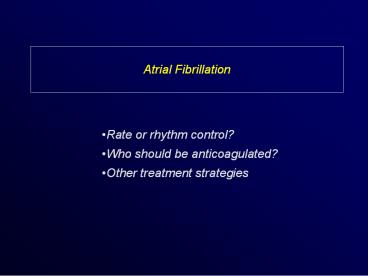Atrial Fibrillation - PowerPoint PPT Presentation
Title:
Atrial Fibrillation
Description:
Atrial Fibrillation Rate or rhythm control? Who should be anticoagulated? Other treatment strategies Classification: Classification: Prevalence of AF: Mechanism of AF ... – PowerPoint PPT presentation
Number of Views:469
Avg rating:3.0/5.0
Title: Atrial Fibrillation
1
Atrial Fibrillation
- Rate or rhythm control?
- Who should be anticoagulated?
- Other treatment strategies
2
(No Transcript)
3
(No Transcript)
4
Classification
Aetiology
LONE AF
VS
ALCOHOL RHEUMATIC HYPERTENSION HYPER
THYROIDISM ISCHAEMIC ETC
5
Classification
Timing
Aetiology
FIRST EPISODE
LONE AF
OR
VS
ALCOHOL RHEUMATIC HYPERTENSION HYPER
THYROIDISM ISCHAEMIC ETC
RECURRENT
PERSISTENT
PAROXYSMAL
PERMANENT
Circulation 20011042118 2150
6
Prevalence of AF
JAMA. 20012852370-2375
7
Mechanism of AF
8
Mechanism of AF
9
Mechanism of AF
10
Burden of AF
Palpitations
AF 5 gt 65
Syncope/Presyncope
Fatigue
11
Burden of AF
Palpitations
AF 5 gt 65
Syncope/Presyncope
Fatigue
DyspnoeaOedema
Heart Failure
Stroke
12
Prognosis of AF
Circulation 199898946-952
13
Principles of management
- RESTORATION MAINTENACE OF SINUS
RHYTHM Rhythm control - CONTROL OF VENTRICULAR RATE Rate control
- REDUCE THROMBOEMBOLIC RISK
14
Restoration of SR
RESTORATION OF SINUS RHYTHM
NB 60 REVERT SPONTANEOUSLY IN lt24 HOURS
ELECTRICAL 1) EXT DC SHOCK 2) INTERNAL SHOCK
- PHARMACOLOGICAL
- 1) FLECAINIDE
- 2) PROPAFENONE
- 3) AMIODARONE
- 4) DOFETILIDE
15
Restoration of SR
ANTICOAGULATION?
RESTORATION OF SINUS RHYTHM
HOW LONG IN AF?
NB 60 REVERT SPONTANEOUSLY IN lt24 HOURS
ELECTRICAL 1) EXT DC SHOCK 2) INTERNAL SHOCK
- PHARMACOLOGICAL
- 1) FLECAINIDE
- 2) PROPAFENONE
- 3) AMIODARONE
- 4) DOFETILIDE
lt48 HOURS NO HEPARIN 3 WEEKS WARFARIN POST
SHOCK
gt48 HOURS 3 WEEKS WARFARIN PRE POST
SHOCK or TOE GUIDED SHOCK 3 WEEKS
WARFARIN POST SHOCK
16
Maintenance of SR (prevention of AF recurrences)
1) DRUG TREATMENT
17
Maintenance of SR (prevention of AF recurrences)
- 2) OTHER TREATMENTS
- Pacing
- Atrial Defibrillators
- Cardiac Surgery
- Catheter radiofrequency ablation
18
Rate control
VENTRICULAR RATE CONTROL
PHARMACOLOGICAL 1) DIGOXIN 2) ? BLOCKER 3) CA
CHANNEL BLOCKER 4) AMIODARONE
- ABLATION
- RADIOFREQUENCY
- ABLATION OF
- ATRIOVENTRICULAR NODE
- PACEMAKER
19
Rate vs rhythm control
Rate (Remain in AF) Rhythm (Restore
SR) advantages Good symptom
control Good symptom control Simple low risk
treatment Normal physiology/cardiac function
Better prognosis ?? disadvantages Abnorm
al cardiac function Complex higher risk
treatment Stroke risk ?? Antiarrhythmic drugs
- proarrhythmic Worse prognosis??
20
Rate vs rhythm control - PIAF
PIAF study Lancet 20003561789-94
21
Rate vs rhythm control AFFIRM
n 4000 ? age 70
- Rate
- Digoxin
- ? Blocker
- Ca channel blocker
- Rhythm
- Amiodarone
- Propafenone
- Sotalol
- /- DC Cardioversion
AFFIRM study - NASPE 2002
22
Risk of Stroke?
- 1 in 6 strokes have AF
- 6 x stroke rate if have AF
- TYPE OF AF IS NOT A RISK DETERMINANT
Optimal INR?
23
Who should be anticoagulated?
24
(No Transcript)









![[PDF READ] Free Atrial Fibrillation Explained: Understanding PowerPoint PPT Presentation](https://s3.amazonaws.com/images.powershow.com/10084568.th0.jpg?_=20240724064)





















